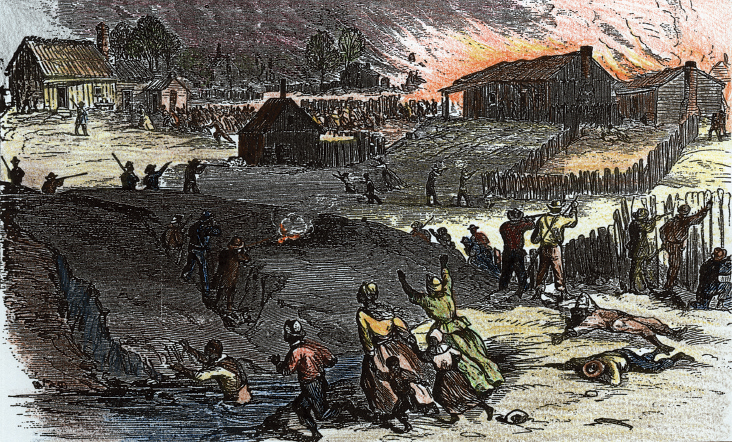America’s History: Printed Page 480
America: A Concise History: Printed Page 439
America’s History: Value Edition: Printed Page 423
Presidential Approaches: From Lincoln to Johnson
As wartime president, Lincoln had offered a plan similar to Johnson’s. It granted amnesty to most ex-Confederates and allowed each rebellious state to return to the Union as soon as 10 percent of its voters had taken a loyalty oath and the state had approved the Thirteenth Amendment, abolishing slavery. But even amid defeat, Confederate states rejected this Ten Percent Plan — an ominous sign for the future. In July 1864, Congress proposed a tougher substitute, the Wade-Davis Bill, that required an oath of allegiance by a majority of each state’s adult white men, new governments formed only by those who had never taken up arms against the Union, and permanent disenfranchisement of Confederate leaders. Lincoln defeated the Wade-Davis Bill with a pocket veto, leaving it unsigned when Congress adjourned. At the same time, he opened talks with key congressmen, aiming for a compromise.
We will never know what would have happened had Lincoln lived. His assassination in April 1865 plunged the nation into political uncertainty. As a special train bore the president’s flag-draped coffin home to Illinois, thousands of Americans lined the railroad tracks in mourning. Furious and grief-stricken, many Unionists blamed all Confederates for the acts of southern sympathizer John Wilkes Booth and his accomplices in the murder. At the same time, Lincoln’s death left the presidency in the hands of Andrew Johnson, a man utterly lacking in Lincoln’s moral sense and political judgment.
Johnson was a self-styled “common man” from the hills of eastern Tennessee. Trained as a tailor, he built his political career on the support of farmers and laborers. Loyal to the Union, Johnson had refused to leave the U.S. Senate when Tennessee seceded. After federal forces captured Nashville in 1862, Lincoln appointed Johnson as Tennessee’s military governor. In the election of 1864, placing Lincoln and this War Democrat on the ticket together had seemed a smart move, designed to promote unity. But after Lincoln’s death, Johnson’s disagreement with Republicans, combined with his belligerent and contradictory actions, wreaked political havoc.

The new president and Congress confronted a set of problems that would have challenged even Lincoln. During the war, Unionists had insisted that rebel leaders were a small minority and most white southerners wanted to rejoin the Union. With even greater optimism, Republicans hoped the defeated South would accept postwar reforms. Ex-Confederates, however, contested that plan through both violence and political action. New southern state legislatures, created under Johnson’s limited Reconstruction plan, moved to restore slavery in all but name. In 1865, they enacted Black Codes, designed to force former slaves back to plantation labor. Like similar laws passed in other places after slavery ended, the codes reflected plantation owners’ economic interests (America Compared). They imposed severe penalties on blacks who did not hold full-year labor contracts and also set up procedures for taking black children from their parents and apprenticing them to former slave masters.
Faced with these developments, Johnson gave all the wrong signals. He had long talked tough against southern planters. But in practice, Johnson allied himself with ex-Confederate leaders, forgiving them when they appealed for pardons. White southern leaders were delighted. “By this wise and noble statesmanship,” wrote a Confederate legislator, “you have become the benefactor of the Southern people.” Northerners and freedmen were disgusted. The president had left Reconstruction “to the tender mercies of the rebels,” wrote one Republican. An angry Union veteran in Missouri called Johnson “a traitor to the loyal people of the Union.” Emboldened by Johnson’s indulgence, ex-Confederates began to filter back into the halls of power. When Georgians elected Alexander Stephens, former vice president of the Confederacy, to represent them in Congress, many outraged Republicans saw this as the last straw.
COMPARE AND CONTRAST
Question
How did Lincoln and Johnson approach Reconstruction differently?